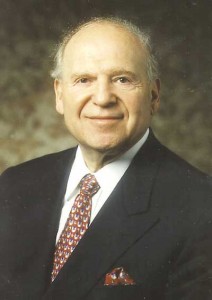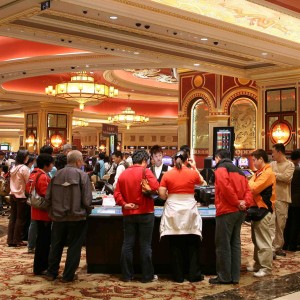 A disclaimer: I tend to agree with Jeffrey Compton that Sheldon Adelson‘s “actions seem nothing but ego-driven overkill.” And by getting into bed with Bible Belt religious conservatives — to whom any form of gambling, not just on the Internet, is anathema — he’s entering dangerous territory. Does he think it’s necessary to destroy the village in order to save it? However, I think Compton assigns too much destructive potential to both Sheldon’s jihad against progress and GOP speechwriter David Frum‘s recent jeremiad on Las Vegas. Could Sheldon “bring down the entire industry like – wait for it – a house of cards”? I very much doubt it. Gambling is a states’ rights issue, it’s become deeply embedded in the fabric of our society and it’s here to stay, barring some totalitarian nightmare. And, after reading Frum’s column described as “overwrought … one of the nastiest anti-Las Vegas (and anti-gaming) commentaries I have read in a very long time,” I was almost disappointed to find the piece relatively mild.
A disclaimer: I tend to agree with Jeffrey Compton that Sheldon Adelson‘s “actions seem nothing but ego-driven overkill.” And by getting into bed with Bible Belt religious conservatives — to whom any form of gambling, not just on the Internet, is anathema — he’s entering dangerous territory. Does he think it’s necessary to destroy the village in order to save it? However, I think Compton assigns too much destructive potential to both Sheldon’s jihad against progress and GOP speechwriter David Frum‘s recent jeremiad on Las Vegas. Could Sheldon “bring down the entire industry like – wait for it – a house of cards”? I very much doubt it. Gambling is a states’ rights issue, it’s become deeply embedded in the fabric of our society and it’s here to stay, barring some totalitarian nightmare. And, after reading Frum’s column described as “overwrought … one of the nastiest anti-Las Vegas (and anti-gaming) commentaries I have read in a very long time,” I was almost disappointed to find the piece relatively mild.
Frum is relevant, in case you were wondering, because he was a speaker at last weekend’s Adelsonmania at Las Vegas Sands. While Frum might accused of schadenfreude, his analysis of Las Vegas’ fall and slow rise tracks with what others might reasonably say: It became too upscale (to drastically oversimplify) and gave customers an incentive to play closer to home. We overbuilt monster-scale hotels whose prosperity hinged not on the bread-and-butter player but on a relatively small number of baccarat-playing “whales” (who kept the lights on during tough times). Visitors are back but they’re clutching their wallets tighter.
 Frum even sounds a dangerously liberal note when he remarks that we’re “a country where more and more people have less and less disposable income.” (Man the barricades!) If there flaws in his analysis, they’re of omission: inept, wannabe casino barons who overspent to get into the market and giddy improvidence on Wall Street that led to insupportable LBOs. But if Frum is throwing verbal ninja darts, they’re too blunt to inflict a pinprick. Las Vegags is an afterthought for the Macao-centric Adelson, so even if he read Frum’s piece, I doubt he gave it much mind.
Frum even sounds a dangerously liberal note when he remarks that we’re “a country where more and more people have less and less disposable income.” (Man the barricades!) If there flaws in his analysis, they’re of omission: inept, wannabe casino barons who overspent to get into the market and giddy improvidence on Wall Street that led to insupportable LBOs. But if Frum is throwing verbal ninja darts, they’re too blunt to inflict a pinprick. Las Vegags is an afterthought for the Macao-centric Adelson, so even if he read Frum’s piece, I doubt he gave it much mind.
What he has done is get religion on internal money controls at Sands’ Chinese casinos.  The come-to-Jesus moment seems to have been a $47 million fine for letting an accused drug kingpin launder money back home at Venelazzo. But Sands China is going to be vetting its VIP junket operators more closely, winnowing out the crop of who does business with Sands. Reports Bloomberg, “Over the past two years, Las Vegas-based Sands has beefed up the teams that monitor players, employing former Federal Bureau of Investigation agents, regulators and attorneys experienced in anti-money laundering law.”
The come-to-Jesus moment seems to have been a $47 million fine for letting an accused drug kingpin launder money back home at Venelazzo. But Sands China is going to be vetting its VIP junket operators more closely, winnowing out the crop of who does business with Sands. Reports Bloomberg, “Over the past two years, Las Vegas-based Sands has beefed up the teams that monitor players, employing former Federal Bureau of Investigation agents, regulators and attorneys experienced in anti-money laundering law.”
Specific measures taken by Sands include the placing of restrictions on checks drawn on business accounts and on daily withdrawals from casino accounts. International money transfers have been ixnayed. Macao is still a giant cash laundry ($202 million last year), but that’s an industry-wide problem. Junkets can do one thing casinos cannot: Collect on bad debt. By comparison, casinos have no standing to enforce defaulted markers.
Cedar Rapids is still in recovery from a 2008 flood, which certainly puts pressure on the Iowa Racing & Gaming Commission to approve the $164 million Cedar Crossing Point. The IRGC is also nearing the end of its 2010 moratorium on new gambling development. However, Riverside Casino & Golf Resort is threatening to reduce its workforce by one-third if Cedar Crossing is allowed to encroach upon this market. Isle of Capri Casinos projecting roughly a 9-12% impact on its Waterloo casino. Not surprisingly, Cedar Crossing’s own projections were much smaller: 5%. This is one of those times I’m glad I don’t have a vote in the matter.

